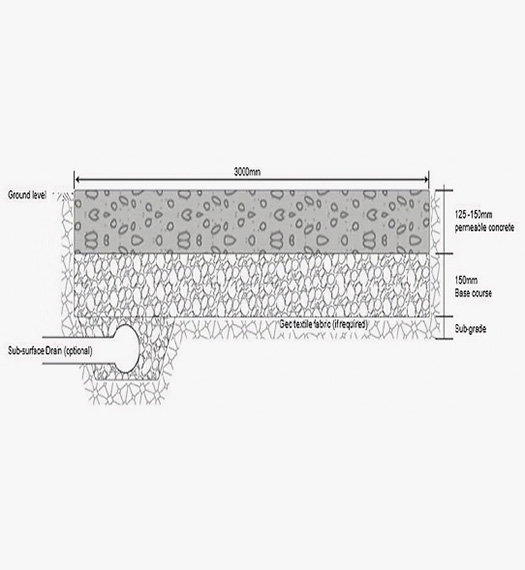Permeable Concrete
Also known as pervious or porous concrete
Permeable concrete is a durable, sustainable, and easy-to-install solution for modern concrete construction work. As a type of porous concrete, it features an aerated structure that allows water to filter through the permeable concrete pavement and soak directly into the sub-grade. This eliminates the need for conventional stormwater systems and helps prevent surface ponding.
By directing rainwater into the ground, permeable concrete supports natural water cycles and helps recharge soils. It also enables compliance with council regulations, as it doesn’t count as impervious concrete, giving developers more flexibility when calculating building coverage.
Thanks to its classification as a non-hard surface, permeable concrete, permeable paving blocks and permeable interlocking concrete pavers allow for a greater building footprint, ideal for residential or commercial projects aiming to maximise usable space.
When comparing pervious concrete cost vs concrete, it’s important to factor in long-term benefits. Whilst the price of permeable concrete may be slightly higher upfront, its durability, stormwater management advantages, and contribution to sustainable urban design make it a smart long-term investment.
Whether you’re installing a permeable concrete driveway, evaluating pervious concrete strength, choosing permeable concrete can significantly enhance your project’s sustainability and design flexibility.
How Permeable Concrete Pavement Is Constructed
The construction of a permeable concrete pavement system involves multiple layers, each designed to manage stormwater effectively while providing structural support:
- Surface Layer – Permeable Concrete
The top layer consists of permeable concrete, which allows rainwater to flow through the surface instead of pooling. This layer channels water down into the pavement system, eliminating the need for conventional stormwater drains. - Base Course – Stone Aggregates
Beneath the surface lies the base course, made up of loosely compacted stone aggregates. This layer acts as the structural foundation and provides temporary water storage before it drains into the sub-grade. The permeable concrete cost can vary depending on the required thickness of this layer. - Filter Layer – Geotextile Fabric
Depending on soil conditions, a filter cloth or geotextile membrane may be installed between the base course and the sub-grade. It allows water to pass through freely while preventing fine particles from clogging the stone base, crucial for long-term permeable concrete cleaning and maintenance. - Sub-Grade – Natural Ground
At the bottom lies the sub-grade, which is the undisturbed soil beneath the pavement. Its load-bearing strength determines the thickness of the layers above and directly influences the durability of the overall concrete pavement.

Optional: Sub-Surface Drainage
In areas with limited soil permeability, an optional sub-surface drain may be added to redirect excess water to the stormwater system, ensuring the system remains functional during heavy rainfall.

